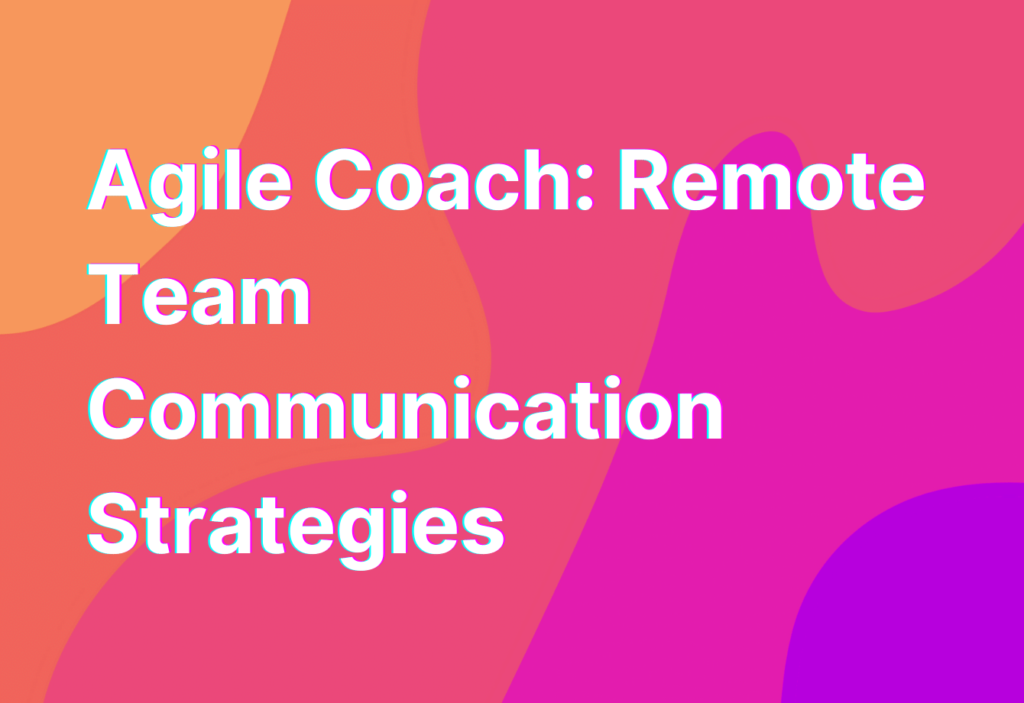Agile Coach: Remote Team Communication Strategies
Hey there, fellow remote workers! It’s Ashley, your friendly remote work advocate, back with another helpful article. Today, I want to talk about a crucial role in remote teams: the Agile coach. As an Agile coach myself, I’ve learned a thing or two about effective communication strategies for remote teams. So, grab your favorite cup of coffee and let’s dive in!
Why Remote Teams Need Agile Coaches
Before we get into the nitty-gritty of communication strategies, let’s quickly touch on why remote teams need Agile coaches in the first place. Agile coaches play a vital role in helping teams embrace the Agile methodology and navigate the challenges of remote work.
Agile coaches are like the conductors of a remote team orchestra. They ensure that everyone is in sync, working towards the same goals, and communicating effectively. Without an Agile coach, remote teams can easily fall into the trap of miscommunication, lack of collaboration, and decreased productivity.
Now that we understand the importance of Agile coaches, let’s explore some communication strategies they can implement to keep remote teams thriving.
1. Foster a Culture of Open Communication
Effective communication starts with creating a culture that encourages open and honest dialogue. Agile coaches can set the tone by promoting transparency, active listening, and respect within the team.
Encourage team members to share their thoughts, ideas, and concerns openly. Create a safe space where everyone feels comfortable expressing themselves without fear of judgment. Remember, communication is a two-way street, so make sure to actively listen to your team members and value their input.
2. Leverage the Right Communication Tools
Remote teams rely heavily on communication tools to stay connected. As an Agile coach, it’s essential to choose the right tools that facilitate effective communication and collaboration.
There are plenty of fantastic tools out there, such as Trello, Slack, and Zoom. These tools offer features like real-time messaging, video conferencing, and project management boards. By leveraging these tools, you can ensure that your team stays connected and informed, no matter where they are in the world.
3. Establish Clear Communication Channels
Clear communication channels are the backbone of remote team success. As an Agile coach, it’s your responsibility to establish these channels and ensure that everyone knows how and when to use them.
Consider creating a communication plan that outlines which channels to use for different types of communication. For example, you might use Slack for quick updates and informal conversations, while email could be reserved for more formal communication.
4. Encourage Regular Check-Ins
In remote teams, it’s easy for team members to feel isolated or disconnected. Agile coaches can combat this by encouraging regular check-ins and team meetings.
Schedule weekly or bi-weekly team meetings to discuss progress, address any challenges, and celebrate wins. These meetings provide an opportunity for team members to connect, share updates, and ask questions. Additionally, consider implementing one-on-one check-ins to provide individual support and guidance.
5. Embrace Visual Communication
When working remotely, non-verbal cues can get lost in translation. That’s why Agile coaches should encourage the use of visual communication methods.
Encourage team members to use video conferencing whenever possible. Seeing each other’s faces can help build rapport, foster better understanding, and reduce miscommunication. Additionally, visual aids like diagrams, charts, and infographics can enhance communication and make complex ideas easier to grasp.
Wrapping Up
And there you have it, my fellow remote workers! Agile coaches play a crucial role in ensuring effective communication within remote teams. By fostering a culture of open communication, leveraging the right tools, establishing clear communication channels, encouraging regular check-ins, and embracing visual communication, Agile coaches can help remote teams thrive.
If you want to dive deeper into the topic of remote team communication and preventing burnout, check out this Burnout prevention article on our website. It’s packed with valuable insights and practical tips to keep your remote team happy and productive.
Until next time, keep communicating and collaborating like the rockstar remote team that you are!


